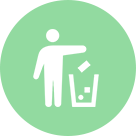What to Do at Home During a Disaster
After an Earthquake
- Protect yourself during any violent shaking
- Be careful of broken glass
- Before evacuating, make sure your gas and electricity are safely turned off
- Gather accurate information
- Open a door to secure an exit
- Don’t run outside in a panic
- Don’t get close to gates or fences
- Call out to your neighbors and gather together
For Use During Disasters: Dial the 171 Message System
During a disaster, phones may have trouble connecting, making it difficult to confirm the safety of family and friends. By dialing 171, you can connect to a messaging system where you can record messages that family and friends can play back later to confirm your safety, or leave messages for people whose safety you would like to confirm. For details on how to use the system, see the following chart:

Evacuation
When to evacuate
- Dealing with a fire in your own home or extinguishing a fire in your neighborhood should be the first priority, but if you are unable to extinguish the fire in its early stages and there is a large danger of it spreading, evacuate.
- Evacuate on the orders of the city police or fire fighters.
- Evacuate if you have judged the situation of your surroundings to justify evacuating.
- After a large earthquake, evacuate if buildings may crumble during aftershocks.
Evacuation is a last resort. If there is no danger from large fires, building collapses, etc., then there is no need to evacuate. However, during life-threatening situations such as where unfavorable conditions such as strong winds pile up and cause the fire to grow and spread, you must evacuate immediately.
How to evacuate
- Escape on foot, carrying as little as possible.
- If there is a set gathering place in your area, go to that place first.
- Avoid dangerous spots and head for the evacuation site.
Disaster Preparations
- Have a discussion with your family about protecting oneself, preventing fire outbreaks, extinguishing early-stage fires, and setting up a way to contact each other (e.g. the 171 Message System).
- Gather emergency supplies and equipment.
- Prepare at least 3 days of food and water (approx. 3 liters per person per day).
- Make preparations for putting out a fire, such as checking your fire extinguisher and keeping water in your bathtub.
- Take precautions when storing hazardous materials such as kerosene or petrol.
- Take anti-shattering measures to protect household items and windows from overturning or shattering.
- Regularly inspect and repair concrete-block walls.
- Participate in disaster prevention practice.
Emergency Supplies and Equipment
- Food, water (at least 3 days’ worth; 1 week’s worth is recommended)
- Flashlight (with extra batteries)
- Portable radio (with extra batteries)
- Valuables (e.g. bank booklet, hanko/personal seal, cash, etc.)
- First-aid medical supplies
- Matches, lighter
- Can opener
- Candles
- Knife
- Clothes, underwear
- Blanket
- Rope
- Sports shoes
If there is a baby or a sick member in your family, don’t forget to prepare medicine, diapers, milk, etc.
Have a talk with your family about what kinds of things are important for you to bring.
- この記事に関するお問い合わせ先
- このページに関するアンケート
-
より良いウェブサイトにするために、このページのご感想をお聞かせください。















更新日:2020年10月26日